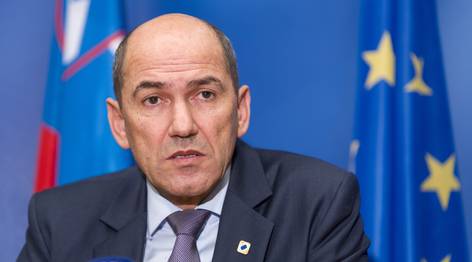NEWS
Prime Minister Janez Janša following the European Council: “The conclusions adopted represent a great step forward.”
“The conclusions adopted represent a great step forward” said Slovenian Prime Minister Janez Janša after the conclusion of the European Council, adding that “the overall political environment in European institutions and in the European Union in general is, at the end of 2012, much better than had been at the beginning of the year”. The EU and European institutions will be able “to better resist to blows and shocks of the economic and financial crisis because of conclusions and measures adopted. These mechanisms are fundamental for preventing negative effects we have been witnessing in the past years”. A positive sign for overcoming the present situation is also the message the meeting sent concerning the solving of the crisis in Greece. According to the Prime Minister "for the first time in many years we may say that there are good prospects that Greece will be able to consolidate its economy and become again a credible Euro zone member, for the benefit if its citizens and of the whole European Union”.
Prime Minister also spoke about the roadmap for the completion of the Economic and Monetary Union, which was the central point in the discussions of the two-day meeting. He highlighted the fact that “the steps taken are going in the right direction, as they are devised to prevent that the Union be unprepared for managing any possible future economic crisis, as happened in 2008. Concrete mechanisms are being put in place, so that negative effects of possible future crises, should there be any and should there be no means to prevent them, would be borne by those who initiated them. In this way, the burden of such crisis will no longer be distributed among all European taxpayers."
Prime Minister also touched upon the conclusions relating to the Syrian crisis: “The EU must make every effort to prevent the suffering of the civilian population in Syria and bring it to an end as soon as possible. The situation has been increasingly deteriorating. It is encouraging that a positive alternative to the current regime, which is most responsible for the violence, has started to emerge. The EU will cooperate with this Syrian opposition and will make this cooperation conditional upon all values and principles on which the EU itself is founded.”
After the European Council meeting, Prime Minister Janša met with Economic and Monetary Affairs Commissioner Rehn and briefed him about a referendum to block the Slovenian budget. Prime Minister Janša pointed out that this unusual move, which is only undertaken in Slovenia and is not used anywhere else, is a problem and a negative signal for the entire euro area. In relation to this issue, Prime Minister Janša expressed his expectations that the Constitutional Court would decide on this matter as soon as possible.
He outlined to Commissioner Rehn the main efforts made by the Government to “steer Slovenia away from dangerous waters”.
Prime Minister Janša maintained: “Through the referendum initiatives that cause blockades, Slovenia is sending a negative signal beyond European borders, given that our responsibilities are not only internal but also external. Our irresponsible behaviour poses a threat to others as well.”
Prime Minister Janša spoke about the situation in Slovenia later in the press conference and asserted that a new supplementary budget for current year would not be required. He also pointed to the fact that Slovenia had managed to attain the fiscal objective as set in the relevant strategic documents for the first time since the start of the crisis. This is of particular importance for Slovenia's credibility and is, at the same time, a message that Slovenia sends to the European Commission and other international institutions. Prime Minister Janša also emphasised that this makes the forecasts for the Slovenian future much more credible than in the past.





